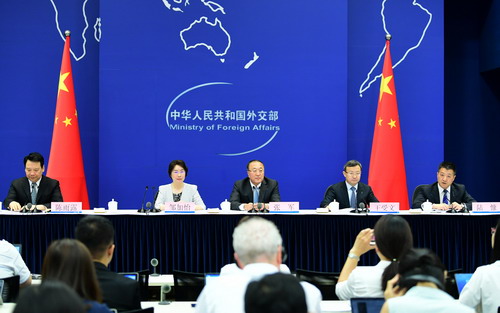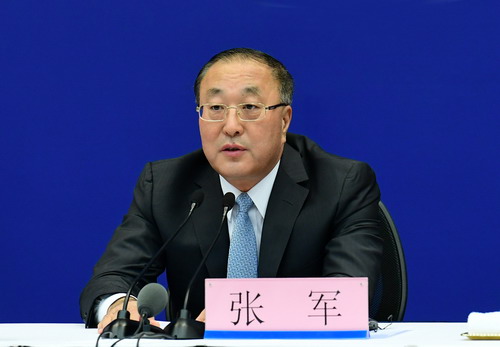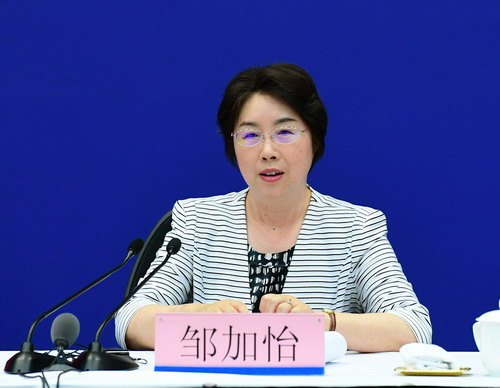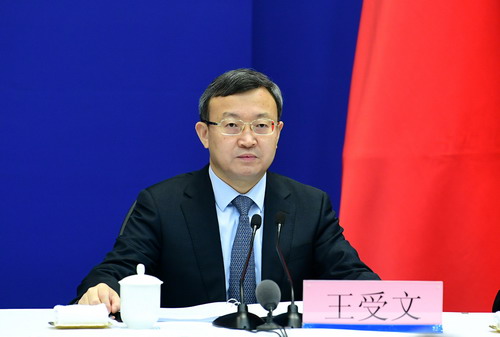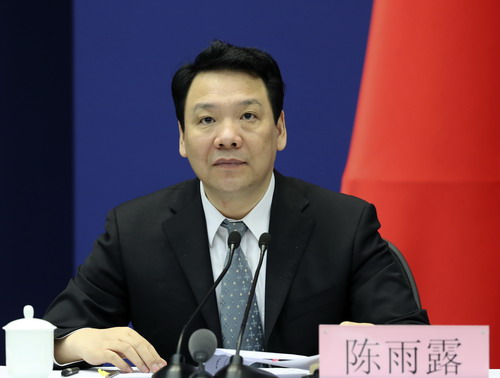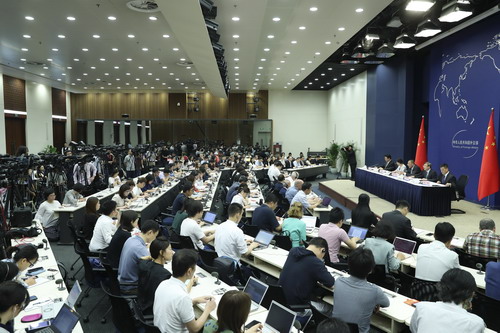| The Ministry of Foreign Affairs Holds a Briefing for Chinese and Foreign Media on President Xi Jinping's Attendance at the 14th G20 Summit |
| 2019-06-24 11:51 |
|
On June 24, 2019, the Ministry of Foreign Affairs held a briefing for Chinese and foreign media. G20 Sherpa of the Chinese side and Assistant Foreign Minister Zhang Jun, Vice Minister of Finance Zou Jiayi, Vice Minister of Commerce and Deputy China International Trade Representative Wang Shouwen, and Deputy Governor of the People's Bank of China Chen Yulu briefed the media on President Xi Jinping's upcoming attendance at the 14th G20 Summit and answered the questions from journalists.
Zhang Jun expressed that the 14th G20 Summit will be held in Osaka, Japan from June 28 to 29. This will be the seventh consecutive time for President Xi Jinping to attend or chair the G20 summit, which fully demonstrates the great importance the Chinese side attaches to G20 cooperation and global economic governance. President Xi Jinping will attend four plenary sessions of the summit, and attend discussions on world economy and trade, digital economy, inclusive and sustainable development, infrastructure, climate, energy and environment issues. President Xi Jinping will expound his views on the world economic situation and commit to finding the root cause of the current problems, making an accurate assessment and giving right prescriptions to grasp the general direction of the world economy. President Xi Jinping will attend an informal BRICS leaders' meeting, an informal China-Russia-India leaders' meeting and a small-scale China-Africa leaders' meeting to enhance communication and coordination on major issues such as deepening cooperation between emerging markets and developing countries and implementing the 2030 Agenda for Sustainable Development of the United Nations, so as to promote practical cooperation. President Xi Jinping will also hold bilateral meetings with leaders of various countries to endeavor to deepen cooperation with relevant countries and push forward bilateral relations. Zhang Jun pointed out that the G20 is a major forum for international economic cooperation. At present, unilateralism and protectionism have seriously impacted on the international economic order, and the risks and uncertainties facing the world economy have risen markedly. As the world's second largest economy, China has long made important contributions to promoting world economic growth, improving global governance and addressing risks and challenges, and played a constructive role as a responsible major country. Under the current circumstances, the host country Japan and the international community have high expectations for President Xi Jinping's attendance at the Osaka Summit. The Chinese side is ready to contribute to the positive outcomes of the G20 Osaka Summit. We are ready to work with all parties to firmly uphold multilateralism, maintain the international order based on the international law, and preserve international fairness and justice; we should stay committed to the right direction of the G20, uphold the spirit of partnership, strengthen policy coordination and maintain unity and cooperation; and we should work together to meet global challenges, and promote all parties to address major issues concerning the prospect of global economic growth and the pattern of global economic governance through cooperation in a responsible and constructive manner, to seek common development and build a community with a shared future for mankind.
Zou Jiayi said that this year's financial channel cooperation of the G20 is generally stable and fruitful. It focuses not only on short-term economic situation and risks, but also on addressing global medium- and long-term challenges. In June, the last meeting of G20 finance ministers and central bank governors was held successfully before the summit, which made adequate financial policy preparations for the Osaka Summit and achieved the following results: First, we have maintained policy coordination and global economic and financial stability. The G20 members reiterated that they would continue to use all policy tools to enhance confidence through enhanced dialogue and action to achieve strong, sustainable, balanced and inclusive growth of the world economy. Second, we have adhered to the development orientation and formulated investment principles for high-quality infrastructure. The meeting endorsed the G20 Principles for Quality Infrastructure Investment. This outcome document is based on development and supports development. It reflects the important concepts of extensive consultation, joint contribution and shared benefits and connectivity that China has always advocated. It is also a deepening and continuation of the relevant consensus of the Hangzhou Summit and a useful reference for all parties to promote high-quality infrastructure investment in the future. Third, we have improved global imbalances and promoted balanced and sustainable economic growth. The meeting adopted the Summary of the G20 Global Imbalances, which formed an objective consensus on some important issues such as global current account imbalances, global imbalance structure and how to solve trade imbalances. Many countries have acknowledged China's important progress in reducing external imbalances and its tremendous contributions to improving global imbalances. Fourth, we have focused on long-term challenges, and on ageing and universal health coverage. The meeting held that all parties in the G20 should actively address the issue of ageing, support intergenerational equality and ensure the sustainability of public finance through inclusive labor market policies, reform of the elderly care system and improving the efficiency of public revenue and expenditure.
Wang Shouwen noted that under the current situation, the international community expects the G20 Osaka Summit to continue to show cohesion and efficiency, conduct candid, in-depth and constructive dialogues on important international economic and trade issues, and provide new guidance and ideas for world economic development under the new situation. The joint statement issued by the G20 Trade Ministers' Meeting in June has formed a positive consensus on building a sound trade and investment environment, promoting the reform of the World Trade Organization (WTO), strengthening connectivity between trade and digital economy, and promoting sustainable and inclusive growth, which has injected momentum into deepening G20 economic and trade cooperation. The Chinese side expects all parties to, based on this, promote more consensuses in the following areas in the Osaka Summit: first, we should promote the necessary reform of the WTO in a constructive manner. The Chinese side supports the necessary reform of the WTO to enhance its authority and effectiveness. We expect that the summit will further build positive consensus on supporting the multilateral trading system, and opposing unilateralism and protectionism. Second, we should build a free and open policy environment for trade and investment. The Chinese side is ready to work with all parties to adhere to an open policy and build a free, fair, non-discriminatory, transparent, predictable and stable trading and investment environment for enterprises and investors of all countries. Third, we should strengthen practical cooperation in trade and investment to promote inclusive and sustainable growth. We expect that the summit will actively explore new growth momentum and development path, and promote the deep integration of trade and investment with the digital economy, so that new technologies and knowledge will benefit more countries and people. It is believed that the Osaka Summit will achieve positive and practical economic and trade results, promote economic globalization to develop toward a more open, inclusive, universally beneficial, balanced and win-win direction, and inject impetus into promoting world economic growth.
Chen Yulu mainly introduced the situation in following aspects: first, on macroeconomic policy coordination. The Chinese side expects all parties of the G20 to continue the previous consensus, send a clear and positive signal to the outside world, adhere to multilateralism, strengthen dialogue and communication, further improve macroeconomic policy coordination, make comprehensive use of various policy tools such as fiscal, monetary and structural reforms, jointly maintain global financial stability and promote strong, sustainable, balanced and inclusive growth of the global economy. Second, on international financial architecture. The Chinese side has always supported a strong, share-based and well-resourced International Monetary Fund (IMF). We expect that the Osaka Summit will continue to affirm the central position of the IMF in the global financial safety net, and continue to engage in constructive dialogue with all parties to jointly promote relevant work. Third, on financial sector issues. The Chinese side hopes that the summit will agree to strengthen cooperation in financial regulation and cope with related negative impacts. While affirming the positive significance of the application of new technologies in the financial field and encouraging innovation, the Chinese side will pay attention to relevant risks and work with all parties to promote international cooperation in anti-money laundering and anti-terrorism financing. Fourth, on green finance. Developing green finance is conducive to promoting high-quality development. The Chinese side expects that the Osaka Summit will continue to affirm the importance of green finance to global economic growth, and will continue to strengthen cooperation with all parties to promote sustainable development of the global economy through the development of green finance. Fifth, on inclusive finance. The development of inclusive finance is conducive to improving the availability and convenience of financial services and promoting inclusive economic growth. The Chinese side is willing to continue sharing its experience with all parties to jointly promote inclusive global economic growth.
|
| |||||||||||||
| |||||||||||||
